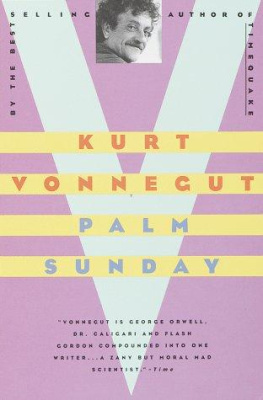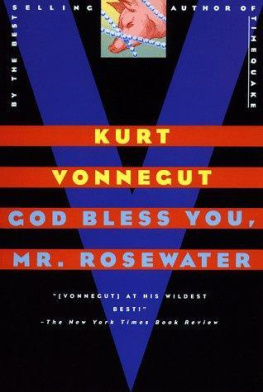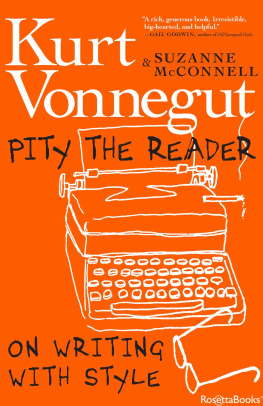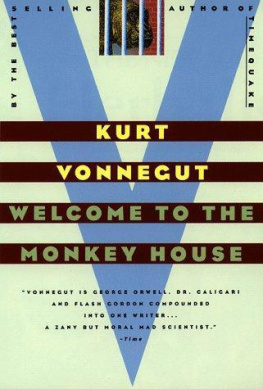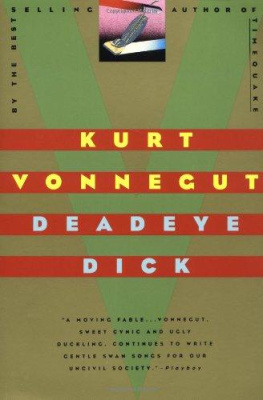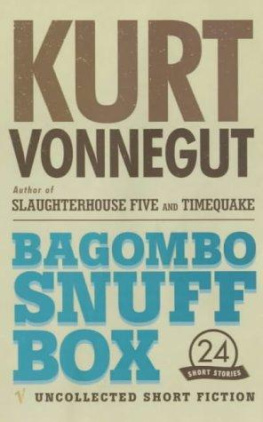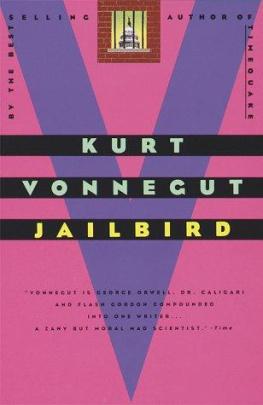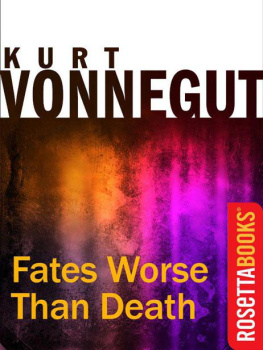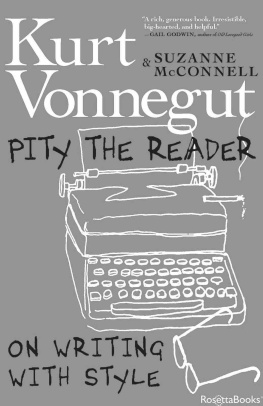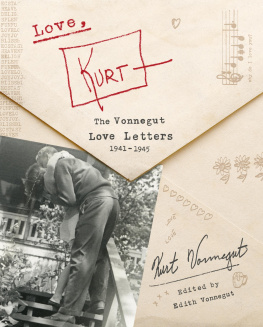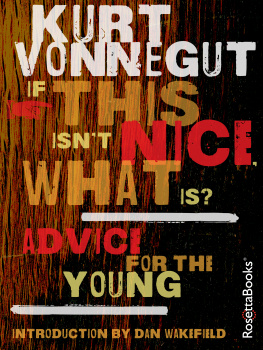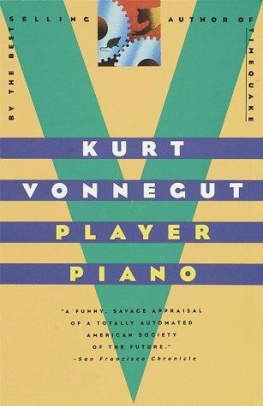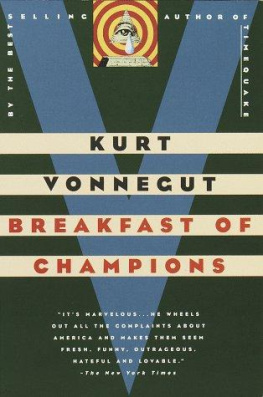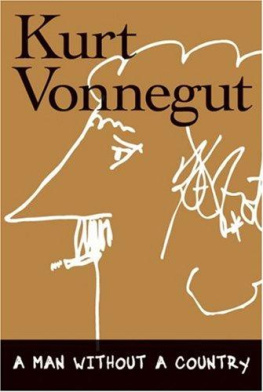PALM SUNDAY
An Autobiographical Collage
For my cousins the de St. Andrs everywhere.
Who has the castle now?
TABLE OF CONTENTS (BITS OF THE COLLAGE)
INTRODUCTION
THIS is a very great book by an American genius. I have worked so hard on this masterpiece for the past six years. I have groaned and banged my head on radiators. I have walked through every hotel lobby in New York, thinking about this book and weeping, and driving my fist into the guts of grandfather clocks.
It is a marvelous new literary form. This book combines the tidal power of a major novel with the bone-rattling immediacy of front-line journalismwhich is old stuff now, God knows, God knows. But I have also intertwined the flashy enthusiasms of musical theater, the lethal left jab of the short story, the sachet of personal letters, the oompah of American history, and oratory in the bow-wow style.
This book is so broad and deep that it reminds me of my brother Bernard's early experiments with radio. He built a transmitter of his own invention, and he hooked it up to a telegraph key, and he turned it on. He called up our cousin Richard, about two miles away, and he told Richard to listen to his radio, to tune it back and forth across the band, to see if he could pick up my brother's signals anywhere. They were both about fifteen.
My brother tapped out an easily recognizable message, sending it again and again and again. It was "SOS." This was in Indianapolis, the world's largest city not on a navigable waterway.
Cousin Richard telephoned back. He was thrilled. He said that Bernard's signals were loud and clear simply everywhere on the radio band, drowning out music or news or drama, or whatever the commercial stations were putting out at the time.
THIS is certainly that kind of masterpiece, and a new name should be created for such an all-frequencies assault on the sensibilities. I propose the name blivit. This is a word which during my adolescence was defined by peers as "two pounds of shit in a one-pound bag."
I would not mind if books simpler than this one, but combining fiction and fact, were also called blivits. This would encourage The New York Times Book Review to establish a third category for best sellers, one long needed, in my opinion. If there were a separate list for blivits, then authors of blivits could stop stepping in the faces of mere novelists and historians and so on.
Until that happy day, however, I insist, as only a great author can, that this book be ranked in both the fiction and nonfiction competitions. As for the Pulitzer prizes: this book should be eligible for a mega-grand slam, sweeping fiction, drama, history, biography, and journalism. We will wait and see.
THIS book is not only a blivit but a collage. It began with my wish to collect in one volume most of the reviews and speeches and essays I had written since the publication of a similar collection, Wampeters, Foma & Granfalloons, in 1974. But as I arranged those fragments in this order and then that one, I saw that they formed a sort of autobiography, especially if I felt free to include some pieces not written by me. To give life to such a golem, however, I would have to write much new connective tissue. This I have done.
The reader should expect me to chat about this and that, and then to include a speech or a letter or a song or whatever, and then to chat some more.
I do not really consider this to be a masterpiece. I find it clumsy. I find it raw. It has some value, I think, as a confrontation between an American novelist and his own stubborn simplicity. I was dumb in school. Whatever the nature of that dumbness, it is with me still.
I have dedicated this book to the de St. Andres. I am a de St. Andre, since that was the maiden name of a maternal great-grandmother of mine. My mother believed that this meant that she was descended from nobles of some kind.
This was an innocent belief, and so should not be mocked or scorned. Or so I say. My books so far have argued that most human behavior, no matter how ghastly or ludicrous or glorious or whatever, is innocent. And here seems as good a place as any to include a statement made to me by Marsha Mason, the superb actress who once did me the honor of starring in a play of mine. She, too, is from the Middle West, from St. Louis.
"You know what the trouble is with New York?" she asked me.
"No," I said.
"Nobody here," she said, "believes that there is such a thing as innocence."
Whoever entertains liberal views
and chooses a consort that is captured
by superstition risks his liberty
and his happiness.
CLEMENS VONNEGUT (1824-1906)
Instruction in Morals
(The Hollenbeck Press,
Indianapolis, 1900)
THE FIRST AMENDMENT
I am a member of what I believe to be the last recognizable generation of full-time, life-time American novelists. We appear to be standing more or less in a row. It was the Great Depression which made us similarly edgy and watchful. It was World War II which lined us up so nicely, whether we were men or women, whether we were ever in uniform or not. It was an era of romantic anarchy in publishing which gave us money and mentors, willy-nilly, when we were young while we learned our craft. Words printed on pages were still the principal form of long-distance communication and stored information in America when we were young. No more.
Nor are there many publishers and editors and agents left who are eager to find some way to get money and other forms of encouragement to young writers who write as clumsily as members of my literary generation did when we started out. The wild and wonderful and expensive guess was made back then that we might acquire some wisdom and learn how to write halfway decently by and by. Writers were needed that much back then.
It was an amusing and instructive time for writersfor hundreds of them.
Television wrecked the short-story branch of the industry, and now accountants and business school graduates dominate book publishing. They feel that money spent on someone's first novel is good money down a rat hole. They are right. It almost always is.
So, as I say, I think I belong to America's last generation of novelists. Novelists will come one by one from now on, not in seeming families, and will perhaps write only one or two novels, and let it go at that. Many will have inherited or married money.
The most influential of my bunch, in my opinion, is still J. D. Salinger, although he has been silent for years. The most promising was perhaps Edward Lewis Wallant, who died so young. And it is my thinking about the death of James Jones two years ago, who was not all that young, who was almost exactly my age, which accounts for the autumnal mood of this book. There have been other reminders of my own mortality, to be sure, but the death of Jones is central perhaps because I see his widow Gloria so often and because he, too, was a self-educated midwesterner, and because he, too, in a major adventure for all of us, which was the Second World War, had been an enlisted man. And let it here be noted that the best-known members of my literary generation, if they wrote about war, almost unanimously despised officers and made heroes of sketchily educated, aggressively unaristocratic enlisted men.
JAMES JONES told me one time that his publisher and Ernest Hemingway's, Charles Scribner's Sons, had once hoped to get Jones and Hemingway togetherso that they could enjoy each other's company as old warriors.
Jones declined, by his own account, because he did not regard Hemingway as a fellow soldier. He said Hemingway in wartime was free to come and go from the fighting as he pleased, and to take time off for a fine meal or woman or whatever. Real soldiers, according to Jones, damn well had to stay where they were told, or go where they were told, and eat swill, and take the worst the enemy had to throw at them day after day, week after week.

